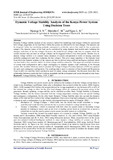| dc.description.abstract | In conventional load flow studies, the active and reactive powers of all load buses are generally specified. Thus, by assuming a constant power load characteristic, the impact of the load in the system is over-emphasized and the theoretical transfer capability is reduced despite increased security margins, which leads to system under utilization. This paper proposes load flow solution with neuro-fuzzy induction motor model which updates the active and reactive powers consumed by the induction motor load during each iteration. Counter-Propagative Artificial Neural Networks (CPANN) are used to classify the weak buses. The stability margin of the weakest buses is investigated using different induction motor load models. The results indicate that the actual situation with induction motor load corresponds to less heavily loaded conditions and a higher voltage was predicted by the power flow. | en_US |

